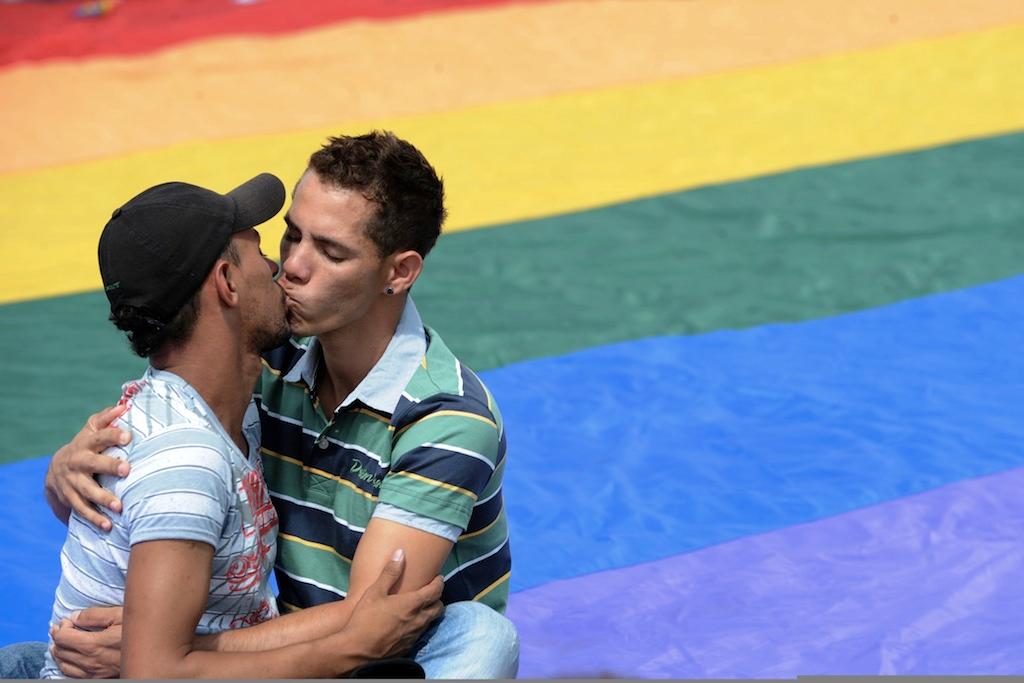Rights group: One gay Brazilian murdered per day
A gay couple kisses during the 2nd Gay Parade Against Homophobia in Brasilia in support of gays, lesbians and transgenders in Brasilia, on May 18, 2011. Despite recent legislative success in terms of marriage, the LGBT community in Brazil faces an increase in murders and hate crimes.
Despite its reputation as one of the greatest party countries on the planet and home of the world's largest gay pride parade, Brazil has a startling violent streak directed at the LGBT community. Hate crimes against gay, lesbian, bisexual and transgender people are incredibly common and despite calls from rights groups, the violence hasn't abated.
Grupo Gay da Bahia (GGB), the country's oldest and largest gay rights advocacy group, reports there was a gay hate crime every 36 hours in 2011, and the numbers are only growing. In the first weeks of 2012, 75 people have already been murdered — just for being gay.
Brazil allows same-sex marriage, adoption by same-sex couples, and even includes gender reassignment surgery in state-sponsored medical procedures. But GGB's report suggests the truth is different than what meets the eye, in that many Brazilians are stridently homophobic.
The murder of Edson Neris de Silva by 18 skinheads in a public square in 2000 caught the country's attention and brought the issue of gay hate crimes into the open. De Silva's death sparked a call for anti-hate crime legislation.
Ten years later in 2010, a 14-year-old was strangled and beaten to death by skinheads in Sao Paulo. His mother said to the BBC, "Brazil is a very hypocritical society, it pretends to be tolerant but it isn't. We have the best Carnival in the world and it appears that everyone lives together harmoniously, yet gay couples still can't kiss in public." She added, "Every time we have a march to promote tolerance, the Church groups organize an even bigger one in the name of the family."
Luiz Mott is the founder and head of GGB, and a long-time gay rights activist. In two 2009 and 2010 interviews with Terra Magazine, Mott blamed evangelical religious groups for country's lingering culture of hate.
There is “a whole cultural and institutional homophobia that still exists and has, in evangelical churches and Catholic churches, the great manufacturing centers for such ideological weapons,” he said. "Christian churches in general have their hands stained with blood, the intolerance that spread in pulpits and on television. They provide ideological ammunition to those who have hatred for homosexuals, so that this hatred will increase."
Mott also attacked former President Luiz Inacio Lula da Silva for not doing enough to combat the homophobia coming from the other side of the aisle for fear of alienating the churches.
“Lula had a lack of political will to pass nearly a dozen laws in Congress aimed at full homosexual citizenship,” said Mott. “To enact such laws, political will and pressure by the executive on the legislature were necessary. Lula, unfortunately, lacked the courage and boldness to press his power base.”
Much of the violence seems to originate away from the Church, however. Many of the murders and attacks on gay men, women, and transgendered people have been perpetrated by skinheads and neo-Nazis as retaliation for passage of pro-gay legislation such as a gay marriage law, and recently in retaliation for controversial "gay kits," which were to be used in schools to teach children about homosexuality. (The kit was lauded by gay rights advocates and later vetoed by President Dilma Rousseff.)
There is presently no hate crime law in Brazil that addresses homophobia, although there is one that criminalizes prejudice on on the "grounds of race, colour, religion, or national origin," according to the BBC, and President Rousseff faces trouble from her party for not doing enough to combat this violent homophobia.
"Brazil is at a pivotal moment in its history," said Amnesty International's US blog. "The new administration can choose between allowing hate crimes to continue festering the nation’s stance towards human rights, or promote respect and equality for all."
We want to hear your feedback so we can keep improving our website, theworld.org. Please fill out this quick survey and let us know your thoughts (your answers will be anonymous). Thanks for your time!
